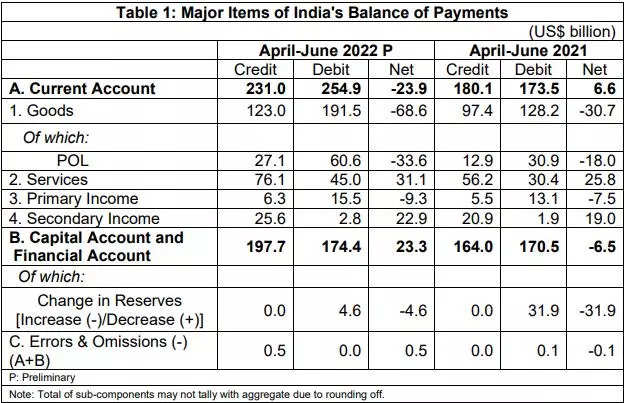


India's current account deficit widens to $9.7 billion in the first quarter of fiscal year 2024, mainly due to a rise in merchandise trade deficit. This is a key indicator of the country's external sector and shows an increase from the $8.9 billion deficit in the same quarter last year. At the same time, net foreign direct investment inflows have increased to $6.3 billion and net external commercial borrowings have decreased to $1.8 billion in the current quarter. Non-resident deposits have also increased to $4 billion.
India's Current Account Deficit Widens to $9.7 Billion, Sparking Concerns
India's current account deficit, a key indicator of the country's external sector, has widened to $9.7 billion in the first quarter of fiscal year 2024, according to data from the Reserve Bank of India (RBI). This marks an increase from the $8.9 billion deficit recorded in the same quarter of the previous fiscal year.
The widening deficit is primarily attributable to a surge in merchandise trade deficit, which reached $113.1 billion during the quarter. This was driven by a sharp rise in imports and a modest growth in exports. The trade deficit was further exacerbated by a decline in net services exports.
Despite the widening current account deficit, there are positive signs in other areas of the external sector. Net foreign direct investment (FDI) inflows increased to $6.3 billion, while net external commercial borrowings (ECBs) declined to $1.8 billion. Non-resident deposits also rose to $4 billion.
Background
A current account deficit occurs when a country imports more goods and services than it exports. This deficit can be financed through inflows of foreign capital, such as FDI, ECBs, and remittances.
India's current account deficit has been a concern for policymakers in recent years, as it can lead to currency depreciation and put pressure on the country's foreign exchange reserves. The widening deficit in the first quarter of FY24 raises concerns about the sustainability of India's external sector in the face of rising global uncertainty and geopolitical tensions.
Top 5 FAQs
1. What is the significance of the current account deficit?
The current account deficit is a measure of the country's net trade in goods and services, and indicates whether the country is a net borrower or lender in the international financial markets.
2. Why has India's current account deficit widened?
The widening deficit is mainly due to a surge in merchandise trade deficit, caused by a rise in imports and a modest growth in exports.
3. What are the implications of a widening current account deficit?
A widening current account deficit can lead to currency depreciation, put pressure on foreign exchange reserves, and increase the country's external debt burden.
4. What measures can be taken to address the widening deficit?
Policymakers can take measures to promote exports, reduce imports, and attract foreign capital to finance the deficit.
5. What is the outlook for India's current account deficit?
The outlook for India's current account deficit is uncertain, but it is likely to remain elevated in the near term due to factors such as rising global commodity prices and geopolitical uncertainties.

As the modern work culture takes a toll on employees' mental and emotional health, Gen Z professionals are leading the charge for a new approach to work-life balance. Dubbed "micro-retiring," this trend involves taking short, independent breaks to rest, recharge, and refocus, rather than resigning or taking a sabbatical mid-career. While this trend empowers individuals to prioritize their well-being, experts highlight the importance of careful planning to ensure financial stability and avoid burnout. With mental health now in the spotlight, micro-retiring is becoming a legitimate and popular choice for young professionals seeking a more fulfilling and balanced life.

The Indian stock market started the day on a negative note, with the Sensex and Nifty both opening in the red. This was due to weak global cues, with the BSE Sensex shedding 160.86 points and the Nifty falling 75.9 points in early trading. However, some stocks showed positive performance, with Eternal leading the pack. Meanwhile, Nifty 50's early indicator Gift Nifty indicated a positive start for the day. The previous day, Foreign Institutional Investors were net sellers while Domestic Institutional Investors bought equities.

The Telangana Southern Power Distribution Company Limited (TGSPDCL) has introduced "Currentolla Praja Baata" in Nalgonda, Medak, Mahabubnagar, Ranga Reddy, and Hyderabad, aimed at enhancing power distribution in the region. Led by CMD Musharraf Faruqui, the initiative will involve over 9,500 employees who will personally visit different areas to interact with consumers and address complaints. This program hopes to minimize power losses, strengthen the network, and improve the quality and reliability of power supply in Telangana.

A new Randstad India report reveals insights about India's youngest workforce cohort and their expectations for their careers. Gen Z prioritizes financial security, flexibility, and a sense of purpose in their job, requiring employers to go beyond just providing a decent salary. With a preference for a combination of a full-time job and a side hustle, Gen Z's mobility is driven by the pursuit of growth, making it crucial for employers to invest in continuous learning and foster inclusive cultures to retain this transformative generation.

According to Randstad India's latest report, young professionals in India are redefining workplace norms by prioritizing factors like pay, flexibility, and personal values. The report also reveals that Gen Z values continuous learning through AI tools and is more concerned about the impact of AI on job security. This calls for businesses to adapt to changing preferences and attract the next generation of talent by offering a mix of technical excellence and personal autonomy. The findings also emphasize the need for inclusive cultures and flexible policies in order to build resilient, future-ready businesses.

With the Gen-Z workforce making up about 27% of India's population, companies are struggling to retain this energetic cohort. A recent report by Randstad highlights the need for a change in mindset from employers towards the Gen-Zs. While they have long-term aspirations, they are also quick to move on to new opportunities if they feel undervalued or underpaid. This poses a challenge for employers who must find ways to keep this ambitious and driven generation engaged and progressing within their organizations.

Union Home Minister and Minister of Cooperation, Amit Shah, congratulated Amul and Indian Farmers Fertiliser Cooperative Limited (IFFCO) for securing the first and second ranks in the global ranking for cooperatives. This achievement is a testament to the boundless potential of cooperatives, which are being transformed into a global model of empowerment and self-reliance by Prime Minister Narendra Modi. The dairy sector, which is the backbone of rural livelihoods in India, has combined farmer-led cooperatives, women's participation and scientific practices to achieve remarkable progress. Additionally, the National Co-operative Exports Limited, set up by the government, has achieved a significant milestone in exporting agricultural commodities.

After purchasing his retirement property in Swansea, David Barlow has been forced to live in a motorhome on his driveway due to persistent damp and mould issues. Despite complaints to his property managers, the issue has not been resolved and Barlow fears for his belongings. The problem is believed to have been caused by faulty insulation installed by British Gas, but the company denies responsibility. This situation has put a hold on Barlow's retirement plans and has left him feeling frustrated and stuck.

US-based private equity firm Tillman Global Holdings (TGH) is reportedly in advanced discussions to invest up to $6 billion in Vodafone Idea Ltd, which could lead to a change in operational control. However, the investment is contingent on the Indian government providing comprehensive relief covering AGR and spectrum payment dues. If the deal goes through, it could dilute existing promoter holdings, including those held by Aditya Birla Group and Vodafone Plc. While the news has boosted investor sentiment, analysts caution that government approval and debt restructuring clarity are key to the execution of the deal.

The Indian real estate market is undergoing a major shift with rising home prices, as apartments priced between Rs 2 crore and Rs 5 crore now dominate sales. This change has been highlighted by a Redditor who expressed concerns over the dwindling chances of middle-class buyers to afford a house. According to a Moneycontrol report, the trend is a result of big developers focusing more on luxury projects, leaving affordable housing in the backseat. As a result, home ownership for the middle-class seems like a distant dream, with even government employees struggling to afford these expensive properties.